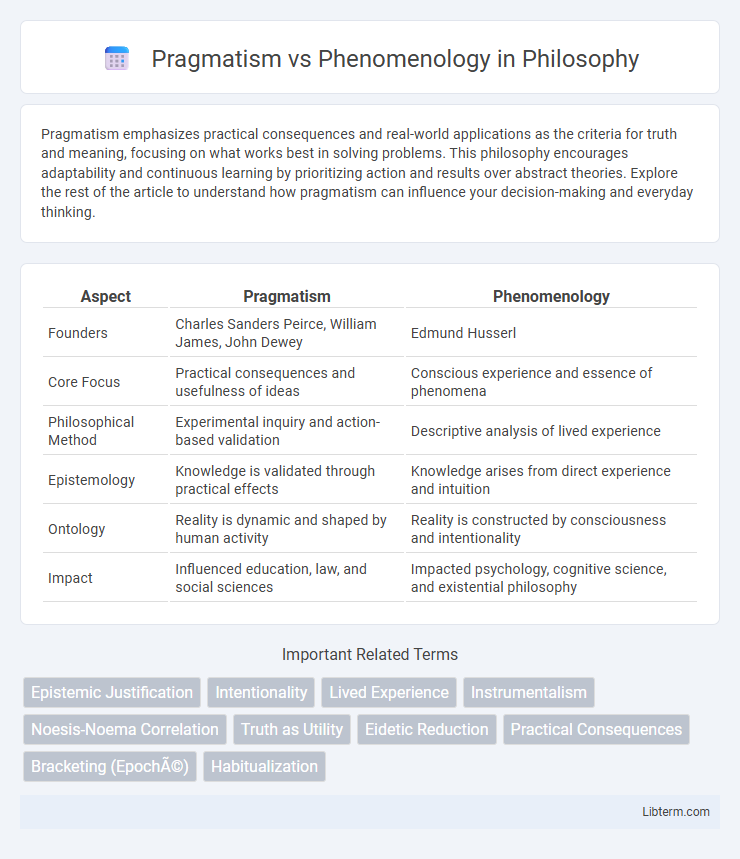Pragmatism emphasizes practical consequences and real-world applications as the criteria for truth and meaning, focusing on what works best in solving problems. This philosophy encourages adaptability and continuous learning by prioritizing action and results over abstract theories. Explore the rest of the article to understand how pragmatism can influence your decision-making and everyday thinking.
Table of Comparison
| Aspect | Pragmatism | Phenomenology |
|---|---|---|
| Founders | Charles Sanders Peirce, William James, John Dewey | Edmund Husserl |
| Core Focus | Practical consequences and usefulness of ideas | Conscious experience and essence of phenomena |
| Philosophical Method | Experimental inquiry and action-based validation | Descriptive analysis of lived experience |
| Epistemology | Knowledge is validated through practical effects | Knowledge arises from direct experience and intuition |
| Ontology | Reality is dynamic and shaped by human activity | Reality is constructed by consciousness and intentionality |
| Impact | Influenced education, law, and social sciences | Impacted psychology, cognitive science, and existential philosophy |
Introduction to Pragmatism and Phenomenology
Pragmatism, developed by philosophers like Charles Sanders Peirce and William James, emphasizes the practical consequences of beliefs and ideas as the core of their meaning and truth. Phenomenology, founded by Edmund Husserl, focuses on the direct exploration and description of conscious experience, aiming to uncover the essential structures of phenomena as they appear to consciousness. Both philosophies seek to address the nature of reality and knowledge but diverge in approach: pragmatism prioritizes utility and outcomes, while phenomenology centers on subjective experience and intentionality.
Historical Background and Key Figures
Pragmatism emerged in the late 19th century United States with key figures like Charles Sanders Peirce, William James, and John Dewey, emphasizing practical consequences and experiential learning as the basis for meaning and truth. Phenomenology began in early 20th century Europe, founded by Edmund Husserl, who focused on the structures of consciousness and intentionality, later expanded by philosophers such as Martin Heidegger and Maurice Merleau-Ponty. The historical contexts reflect pragmatism's roots in American scientific and democratic ideals, contrasting with phenomenology's European philosophical tradition centered on subjective experience and existential analysis.
Core Principles of Pragmatism
Pragmatism centers on the idea that truth is determined by the practical consequences of beliefs and concepts, emphasizing actions and results over abstract principles. Core principles include the belief that ideas must be tested through experience and that knowledge evolves through ongoing inquiry and experimentation. Pragmatists prioritize problem-solving and adaptability, viewing thought as a tool for guiding effective action in real-world situations.
Core Tenets of Phenomenology
Phenomenology centers on the direct investigation of conscious experience, emphasizing intentionality, where consciousness is always about or directed toward something. It seeks to describe phenomena as they are perceived, suspending judgments about external reality through epoche, to reveal the essence of experiences. This contrasts with Pragmatism, which prioritizes practical consequences and utility over subjective experience.
Methodological Differences
Pragmatism employs a practical method emphasizing actions and outcomes to evaluate truths, focusing on problem-solving and the usefulness of concepts in real-world contexts. Phenomenology adopts a descriptive approach, aiming to uncover the structures of consciousness and the essence of experiences through intentional analysis. While pragmatism relies on empirical validation and adaptability, phenomenology prioritizes subjective experience and the suspension of judgment to reveal phenomena as they are perceived.
Pragmatism in Contemporary Philosophy
Pragmatism in contemporary philosophy emphasizes the practical consequences and effects of concepts as central to their meaning and truth, prioritizing action-oriented inquiry over abstract theorizing. Key figures like Richard Rorty and Robert Brandom highlight how knowledge evolves through social practices and linguistic interactions, positioning pragmatism as a flexible and dynamic approach to truth. This contrasts with phenomenology, which centers on the direct examination of conscious experience, making pragmatism more aligned with applied ethics, education, and cognitive science in modern discourse.
Phenomenology’s Influence on Modern Thought
Phenomenology profoundly shapes modern thought by emphasizing direct experience and the structures of consciousness, influencing fields such as psychology, cognitive science, and existential philosophy. Its focus on intentionality and lived experience challenges traditional objectivist approaches, fostering deeper inquiries into perception, meaning, and being. Scholars like Edmund Husserl and Maurice Merleau-Ponty have advanced phenomenology's impact on contemporary debates about human subjectivity and the nature of reality.
Practical Implications and Applications
Pragmatism emphasizes practical outcomes and real-world applications by assessing ideas based on their usefulness and effectiveness in solving problems, particularly in areas like education, law, and technology. Phenomenology focuses on the direct exploration of lived experiences and consciousness, influencing fields such as psychology, qualitative research, and design by prioritizing subjective meaning. Pragmatism drives action-oriented problem-solving while phenomenology enriches understanding through detailed descriptions of human experience.
Comparative Analysis: Strengths and Limitations
Pragmatism emphasizes practical consequences and real-world applications, offering flexibility and adaptability in addressing problems, while its limitation lies in potential neglect of deeper metaphysical questions. Phenomenology provides detailed insights into consciousness and lived experience, enriching understanding of subjective phenomena, yet it often faces criticism for its abstractness and challenges in empirical validation. Comparative analysis reveals that pragmatism excels in pragmatic problem-solving, whereas phenomenology advances the exploration of meaning and intentionality, each approach presenting unique strengths and epistemological constraints.
Conclusion: Bridging Pragmatism and Phenomenology
Bridging pragmatism and phenomenology involves recognizing their complementary insights into human experience and knowledge. Pragmatism emphasizes practical consequences and actions as the basis for meaning, while phenomenology focuses on the direct description of lived experiences and consciousness. Integrating these approaches enriches understanding by linking experiential depth with pragmatic application, fostering a comprehensive framework for analyzing reality and knowledge formation.
Pragmatism Infographic

 libterm.com
libterm.com